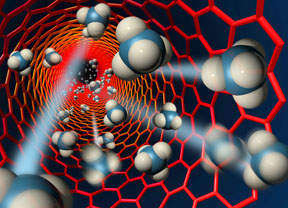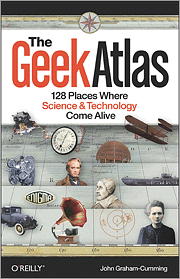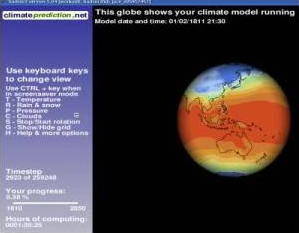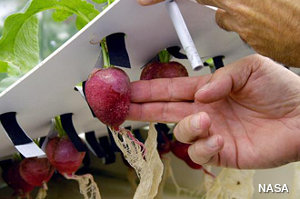

How to be a scientist
by
If you could be any famous figure from history, who would you be? A great politician like George Washington or Thomas Jefferson? A stunning writer—William Shakespeare, perhaps, or Mark Twain? A leader of men like Eisenhower or Sir Winston Churchill? A champion of civil rights such as Martin Luther King or Rosa Parks? A jazz musician like Louis Armstrong or Billie Holliday? All these people achieved greatness in their lifetimes; it'll be a very long time before any of them are forgotten.
Scientists (and inventors who put science to work) sometimes
achieve similar greatness—who could forget Benjamin Franklin or, in
our own time, the very inspiring Stephen Hawking.
But even scientists whose names are unknown can change
the world in very profound ways. You may not have
heard of a chemist called Wallace Carothers, but chances are your
house is a very different place thanks to his endeavors: he invented
Photo: Could you make molecules fly down a tiny carbon tube? Courtesy of US Department of Energy.
How to think like a scientist
You might think science is a subject you study in school—and it
is. But it's not like any other subject. It's not simply a set of facts you
learn and memorize, for example. Science is a way of seeing and
thinking about the world around you. It starts with a basic
curiosity: What makes the Sun seem yellow? Why are carrots
cone-shaped? How can flies always tell when you're just about to swat
them? If you want to know more about the world and why it works the
way it does, you're already halfway to being a scientist. If you
approach these questions in a really systematic way—putting forward
theories and testing them out with

Photo: Why does air spin around in a vortex behind an airplane? If questions like that intrigue you,
you might have the kind of brain that thinks like a scientist!
(You can find out the answer in our article on
How to read like a scientist
There's an extraordinary idea doing the rounds and it goes like
this: since the World Wide Web came along, children don't read anymore. Oddly
enough, people said the same thing about
When I grew up, back in the last century (ho ho), there was no
Want to know what's going on in the scientific world and what the next technological breakthroughs are likely to be? Try these sites for size:
- NASA Education: Lots of material for students from the folks at NASA.
- The Naked Scientists: A friendly site that strips away the dullness and makes science fun again.
- Steve Spangler's Science: Here's an adult who really knows how to make science fun for kids.
- How Products are Made: This huge collection of articles covers just about everything from air bags to temporary tattoos.
- Explore Smithsonian: Trust the Smithsonian to provide such a superb collection of science and technology articles!
- How Things Work: Louis A. Bloomfield tells us all about the physics of everyday life (it's a Web companion to his popular science books).
- Fear of Physics: One of the harder sciences, physics, is explained here
with lots of
computer graphics and animations. - The Nobel Prize: Find out more about the world's greatest scientists: the Nobel Prize winners.
- Students' Classroom: This great site from the National Center for Educational Statistics helps you with the maths behind science. It includes a brilliant create a graph site to help you graph results from experiments and coursework.
- Cocktail Party Physics: Physics with a Twist: This great physics blog is by Jennifer Ouellette.
- Youth Science Centre: Promoting science to young people for over four decades.
Another great way to follow progress is through online science magazines and shows. Here are some of the ones I follow regularly:
- The Material World
- National Geographic
- New Scientist
- Popular Science
- Science
- Science News Online
- Scientific American
- ChemMatters: A magazine that shows high school students how chemistry figures in everyday life.
These make you think about things more critically:
- Bad Science: Ben Goldacre pulls the plug brilliantly on all kinds of dodgy science and medicine.
- Evil Mad Scientist Laboratories: Hands-on science, often turned upside down or inside out, with wit and a suitably evil edge. Lots of great projects here.
If it's
- First LEGO® League: Use LEGO® to tackle real-world challenges in a fun international contest!
- The Big Bang Fair: An annual competition for UK students (only) aged 11-18. Formerly called The National Science and Engineering Competition.
- Lemelson Center for the Study of Invention and Inventing: Inventing is amazingly creative and fun!
- The Secret Life of Machines: A funky cartoon website from Tim Hunkin.
- Patent Pending Blog: Patent attorney Bob Shaver explores the history of technology and invention.
If you prefer books to reading off the screen, there are plenty of excellent science books. Here's
a short review of
How to go back to the future

Photo: The Geek Atlas: At last, a travel book for people who love science and technology!
The online world is still a very new thing and it's far from the only place to discover what science is all about. Before we had websites, science museums were the best places to find out about science and technology—and in many ways they still are. Unlike other museums, which are firmly rooted in the past, science museums have one foot in the future as well! A trip to a science museum is a brilliant way to inspire yourself through the past, present, and future of science. Here are a few of my favorites:
- American Museum of Photography: The story of how photography developed.
- Chemical Heritage Foundation: Think chemistry's boring? Find out about some of the people who built our modern world—literally, from the elements!
- Computer History Museum: The world's biggest museum of computers.
- MOSI (Museum of Science and Industry): There's lots to see at the fabulous science museum in Tampa, Florida, which has its own planetarium, an IMAX® movie theater, and lots more.
- Museum of Science and Industry Chicago: Described as "the oldest museum of its kind in the western hemisphere," the Chicago museum also has some good online exhibits.
- Natural History Museum, London, England: Dinosaurs, bugs, and all kinds of other living stuff.
- New York Hall of Science
- Singapore Science Centre: Gotta love science!
- London Science Museum: England's prestigious science museum is in Kensington, London.
- Think Tank: The ultra-modern science museum in Birmingham, England has over 200 hands-on displays and exhibits. It also has a brilliant collection of old engines and machines.
But don't think for a moment that science and technology is something locked away in museums—it's all around us, all the time. There are lots of ordinary-looking places that have fascinating connections to the inventions and discoveries that shaped our world. Want to know more? Check out John Graham-Cumming's brilliant book called The Geek Atlas.
Science as a hobby: how to be an armchair scientist
It's never been easier to take part in science, no matter what age you are. You can hook your computer up to all kinds of online experiments such as SETI@home, FightAIDSatHome, and ClimatePrediction.Net—and, in a matter of minutes, you can be part of some of the world's most exciting, cutting-edge science. You really can!

Photo: The model I'm running for Climateprediction.net to help scientists understand global warming. Over 47,000 computers in the world are helping to "number crunch" climate data for the project.
One thing scientists do is talk to other scientists. Scientists aren't like polar explorers: they're not making solitary journeys for fame and fortune. Okay, perhaps some of them are doing exactly that—but every scientist is also part of a much wider effort to bust the secrets of the world wide open. Want to know why something you've discovered is so weird and intriguing? Ask a scientist! And you can do just that on all kinds of superb online forums. Here are just a few you can check out:
- Ask the Experts: Lots to questions and answers to browse in the pages of Scientific American.
- How Things Work: Louis A. Bloomfield explains the physics of everyday life in this website companion to his popular science books.
How to put science to the test!
You can find hundreds of great science activities on the web. Please note that these are external sites over which we have no control. While we try very hard to screen and recommend only the most reputable websites, we can't take any responsibility for content provided by other people. In particular, we cannot guarantee that the activities on other sites are safe or appropriate for young people.
- Science Buddies: A really comprehensive free science fair project ideas, answers, and tools to teachers, parents, and students from all walks of life.
- Practical Physics: Offers classroom tested activities for 11–19 year olds. A joint project by the Nuffield Curriculum Centre and The UK's Institute of Physics.
- Surfing scientist: impress your friends and scare your family with these wacky science tricks from Australia's ABC channel.
- Science Explorer: An exploratorium at-home book: Loads of activities from the Exploratorium science museum.
- Do Science: Experiments you can do at home, in a restaurant, or at school.
- National Geographic: Kids: Loads of things you can read, discover, and try for yourself from the world's favorite nature magazine. Includes optical illusions, experiments with floating, and how to make your own hurricane in a bowl of water!
- Science Made Simple: Easy science experiments and science project ideas.
- Cockeyed Science Club: Some more unusual activities!
- The Naked Scientists: Kitchen science experiments: Dozens of very cool experiments you can do at home.
- Science Hobbyist: Some really good how-to's and easy-to-build projects from Bill Beaty, who lists "crackpot physics" as one of his favorite sports!
- The Creative Science Centre: Some really fun things from Dr Jonathan Hare.
Why be a scientist?

Photo: Not all famous scientists are "dead white guys". African-American scientist George Washington Carver (1864?–1943) was a pioneer of 20th-century biotechnology. Born to parents who were slaves in Missouri, he discovered that he loved learning and worked hard to educate himself. Photo courtesy of US Library of Congress.
What are the biggest problems society will have to tackle in the
21st century? There's world poverty. There are illnesses like AIDS
and cancer. There's
If you like thinking about the world around you, why not
become a scientist? It doesn't mean you have to wear a white coat and
thick plastic glasses and spend all your time in a lab! Scientists do
all kinds of amazing things that you might not realize are actually
scientific!

Looking for something to do for the rest of your life? My advice? Take a long, hard look at science. It's fun, it's interesting, and it's ever-changing. I love it! I hope you will too.
Photo: Could you make a breakthrough that helps to feed a hungry world? Photo by courtesy of NASA Kennedy Space Center (NASA-KSC).
Careers in science
Here are some sites that will tell you more about working in science. If you know any more sites along these lines, please do let us know!
- Technology Student Association: "150,000 middle and high school students nationwide aspire to be future engineers, scientists and technologists through the Technology Student Association." Why not join them?
- STEMNET: Encouraging students to think about science, technology, engineering, and mathematics careers (UK-government funded initiative).
- Engineer Girl: Jobs for the boys? No way! There are careers in engineering and technology for girls too.
Please do NOT copy our articles onto blogs and other websites
Text copyright © Chris Woodford 2008. All rights reserved.
This article is part of my archive of old material. Return to the list of archived articles.